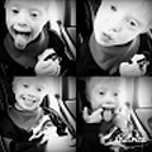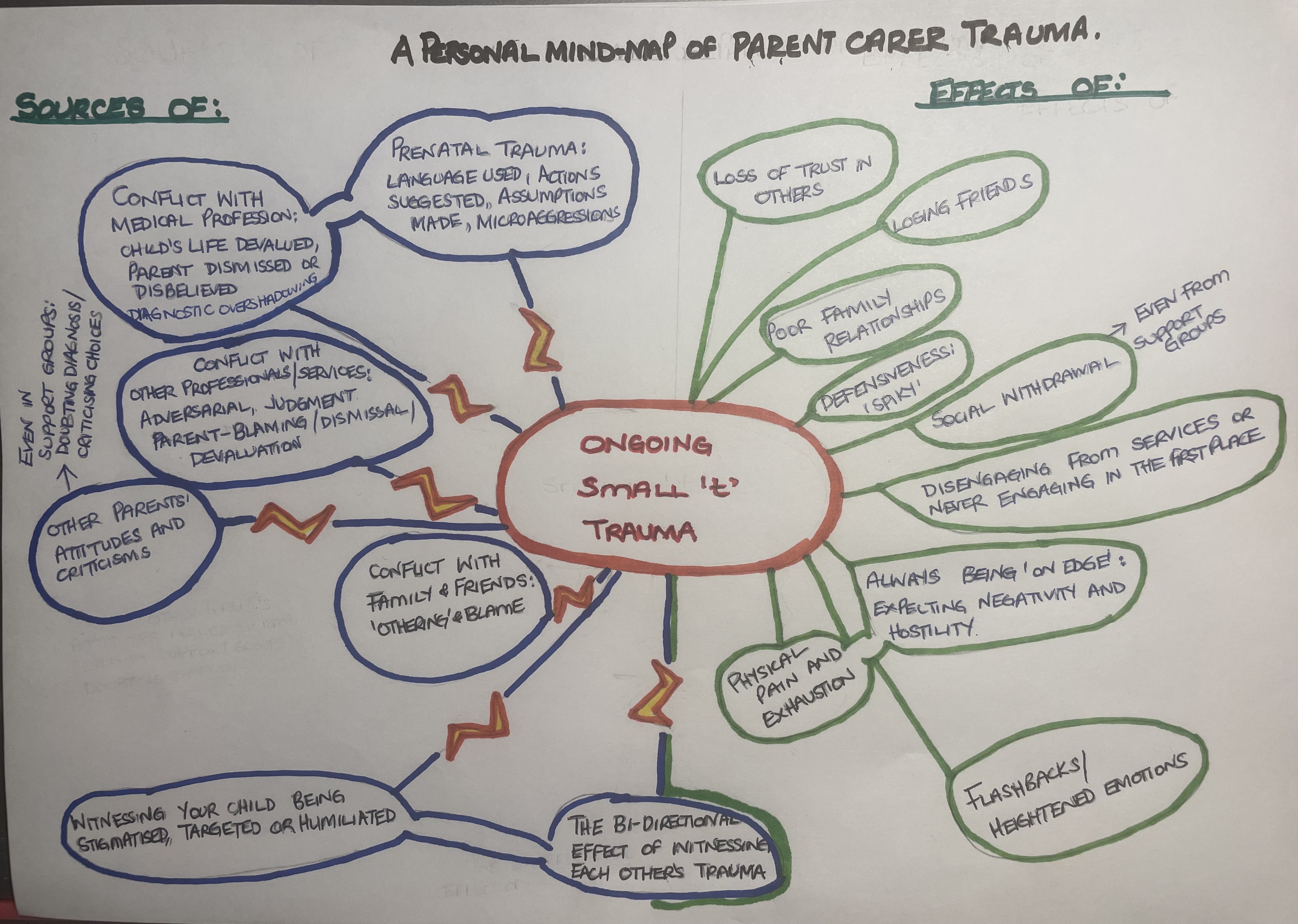Parent Carer Trauma – A Personal Experience (Part Two)

Kerry Fender
Down’s Syndrome, my family and me – one mum’s account of family life with an extra chromosome.

Hello. My name is Kerry. My hobbies are overeating and overthinking. And I am a traumatised parent carer.
At this point I am fully expecting someone to pop up and say: ‘Traumatised, my foot! What have you got to be traumatised about? You wouldn’t know the meaning of the word!’
And I’m ready with my answer, chain-saw tongue poised to cut them down the minute they speak. Or I might even strike first, like I sometimes do with fellow dog walkers who look annoyed when my dog barks at theirs, slicing through their judgment before they can utter a word, leaving them vowing never to meet my eye on a walk again.
I have been called spiky. I wish I could say that it’s a misrepresentation, but it’s not.
Bad attitude? Or trauma response?
But what aspect of my comfortable little life -- of sitting on my backside at home, caring for my child when he’s not at school, writing passive-aggressive, whingey blog posts when he is, and just generally being a drain on the country’s resources -- could be described as traumatic?
Sources of trauma for parent carers like me are many and various. Some are big and obvious, such as having a child with a complex or life-limiting condition; or witnessing them having a life-threatening medical episode from which they may not recover, and so on – trauma with a big ‘T’. But many are less obvious, trauma with a small ‘t’, that could easily fly under most people’s radar.
Inaccessible services/Non-existent services (in the case of my eldest child). When my eldest was diagnosed, I was told by the psychologist that they had no remit to work with us as my son did not have a learning disability, and there were no other services that we could be signposted to. We were cut loose to fend for ourselves. Autism was something I’d only read about in the newspaper, I knew nothing. I stopped looking for help then because there wasn’t any and just managed as best I could by myself. Now, even if help is offered, I’m quite likely to shun it as ‘I’ve managed without before, I can manage without now’.
Witnessing your child being stigmatised, targeted, and humiliated: I can’t think or talk about this without becoming distressed. All I can say is that one of my children’s lives was made hell by another in school. Witnessing it brought one of his TAs to tears and made his teacher say that even she felt unsafe. I will leave you to imagine what it did to my child and to me. When he finally left school I cried buckets, not because my baby boy was all grown up, but because the torment of school was finally over. It wasn’t only my child that was targeted either. I was too: a group of parents decided they were going to confront me at the school gate, en masse, to ‘persuade’ me to remove my child from the school. Fortunately, they were overheard by another parent who warned the head teacher of what was about to happen. Now I am hyper alert for any sign that any member of my family is being stigmatised or targeted, ready to jump in and put a stop to it. I have fallen out with friends over their child’s attitude to mine, which affected my partner more than it affected me. I’m not an easy person to be around.
Affiliate Stigma: Where parents experience prejudice or discrimination through their association with their disabled child. You become ‘that’ parent of ‘that’ child. At the school gate I knew other parents were talking about me, but no one ever talked to me. Waiting there at home time, I would try to go unnoticed: I felt better in winter when I could pull up the hood of my big coat and hide inside it, in summer, I felt exposed. I sent my middle child to a different Primary school, but still stood apart. When other parents tried to talk to me, I was shocked, and very guarded. It took a long time for me to trust that they were being genuine.
The attitudes and criticisms of other parents: including those in support groups who ought to understand. My son and I were driven out of a local autism support group by other parents who insisted that my son couldn’t possibly have autism because he didn’t present like their children and could sometimes make eye contact.
Just because he did it sometimes didn’t mean it was easy for him, he had just absorbed the message that most people expected it, so he tried. Another parent in an online support community posted a vitriolic message calling me a ‘Nazi’ who believed in segregation because I had chosen to send my youngest child to a Specialist school rather than mainstream. This person knew nothing about my son, the area where we live or the state of the schools here.
She immediately blocked me leaving me with no right of reply. I withdrew from those groups, and even though we now have a lovely local Down’s Syndrome support group that I could attend with the youngest, I find it extremely difficult to do so, fearing criticism and rejection even from the very people who ought to understand and accept us.
Conflict with Professionals: From the teachers who put my child on School Action, then School Action plus without ever explaining what they were, or giving any reason other than ‘he asks too many questions’, the same ones who wrote a report, which I saw, in which they stated that my child’s behaviours were motivated by ‘jealousy’ and that the problem was caused by my parenting, the ones who excused another child’s repeated physical assaults on him as being his own fault because he was too articulate and the other child couldn’t understand him, to the continence nurse who discharged my youngest because she didn’t believe I was ‘complying’ properly with the disimpaction regime because it didn’t work in the time-frame she expected, to those doctors who have refused to believe that there is anything that can be wrong with my youngest that can’t be explained away as being due to Down’s Syndrome, and the ones who treated me like an over-anxious helicopter parent and dismissed my concerns that he was seriously ill because he couldn’t tell them how bad he felt and they didn’t accept that I could tell just by his demeanour.
By the time they admitted him he was in agony, unable to eat or drink and probably only a day away from going into septic shock, and we’d both had four nights straight with no sleep because he couldn’t lie down, and I didn’t dare. There are many more examples, but I don’t want to think about them anymore.
I no longer trust anyone. I don’t trust them to do what is best. I don’t trust them to know what is best. I choose not to engage with any professionals or services unless I really have to, and rare occasions when I do, I’m quite likely to disengage very quickly if I detect any hint that I am being patronised, blamed or dismissed. I come across as distrustful of authority and defensive to the point of aggression.
Prenatal Trauma: caused by the language used, actions suggested, assumptions made, and other microaggressions during antenatal care when a potentially disabling condition has been identified before birth. When I was pregnant with my youngest, it was discovered that there was a high chance that he had Down’s Syndrome.
Despite knowing my history of recurrent miscarriage, my consultant was quite insistent that I have an amniocentesis to confirm so that I could have an abortion as soon as possible. He was adamant that abortion was the only way to deal with a diagnosis of Down’s Syndrome, because she said if he was born with it then none of us would ever have any quality of life after, my marriage would break down and my older children would suffer.
All nonsense, of course. I almost stopped going for antenatal check-ups because I became afraid they might somehow force me to terminate if anything showed up that confirmed the diagnosis. I didn’t dare leave him alone in the NICU or on the children’s ward in case they just let him die - I insisted a family member was there with him at all times. I still don’t trust the medical profession to value his life enough to take proper care of him, nor anyone outside of our immediate family to look after him. It’s why I’ve never asked for respite and never will.
There are many more things that can cause ongoing, small ‘t’ trauma to parent carers. These are just my personal experiences.
Each person’s experiences will vary according to their own unique circumstances. The point of this post isn’t to throw a pity party for myself, (heaven knows I didn’t want to have to relive this stuff), it is to let you know that if you have ever experienced anything like this, if you have ever felt the way I feel, you are not being over-sensitive or melodramatic, you are not imagining your trauma, and you are not alone.
Negativity, judgmentalism and microaggression have become such a relentless, bread-and-butter part of my life over the years that I no longer expect anything else. I have grown a coat of prickles like a hedgehog to defend myself. If, and when, people are nice and accepting it always comes as a surprise, and sometimes I am so pathetically grateful I could cry.


